Why choose locally grown blooms?
Now that you know the background of how we got started flower farming, I’d love to explain to you the WHY behind our business. In our first year, our WHY was solely based around our three children. We wanted to have a safe and beautiful place to run and explore nature. We wanted them to see the beauty in simple things and learn all the lessons that growing something from a seed can teach you. While this is still the #1 reason why we became flower farmers, over time we have been inspired by the local flower movement in ways we never thought possible. As we dug into our profession and research, we began to understand that our WHY is so much bigger than we can imagine. Our WHY now includes protecting the eco-system, enriching our environment, and the power of making beautiful memories around flowers.
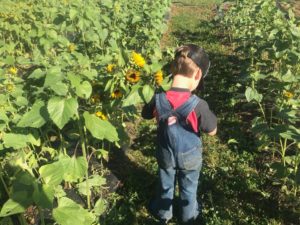
At markets, we love talking flowers and when we get a compliment, I often tell people that “The flowers sell themselves.” I so strongly believe it to be true. Locally grown flowers sell themselves because they are a SUPERIOR product. I wouldn’t be a flower grower if I didn’t’ believe this to be true at my core. There are so many reasons to support your local flower farms including us and seek out locally grown blooms from your favorite florists! Here are just a few reasons why we are so passionate about growing flowers.
They truly are local!
Currently 80% of the flowers consumed in the United States are imported from Mexico, Columbia, Ecuador, Kenya and other South American countries. The transportation of these blooms leave a large carbon footprint due to refrigeration, storage and packaging costs. Imports often have a 1-2 week travel time and are packaged dry so that shipping costs are minimized. When you support a local grower, the flowers never leave the farm and a bucket of fresh water. When you receive a beautiful mixed bouquet of local blooms, you can guarantee those flowers have been freshly picked.
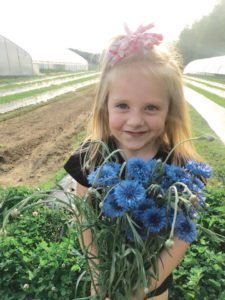
Imports are full of chemicals
When flowers are imported, the growing processes primarily utilize herbicides and pesticides to mitigate pest damage and increase growth. Due to the US Customs regulations, flowers are sometimes fumigated before they enter the United States. I don’t have to sit here and tell you how harmful these chemicals can be to your health, you already know that. Many local flower farms, include ourselves, utilize organic growing methods and don’t spray our flowers with anything that isn’t natural. Go head, dunk your nose into a delicious smelling Bloom Hill bouquet – you don’t have to worry about the long term effects. Your only worry is the glorious smell and joy that bunch of blooms will bring you. It has always been a priority at our farm to grow organically so our kids and pets can run free around the property without worrying about what latest chemical has been sprayed. We believe the benefit is huge to you too!
Local blooms are responsibly grown
Along with ourselves, most flower farms we know employ all natural weed management, integrated pest management systems, and cover cropping plans. These techniques enrich our soil and environment, leading to a more diverse eco-system that support beneficial creatures such as bees and other insects.
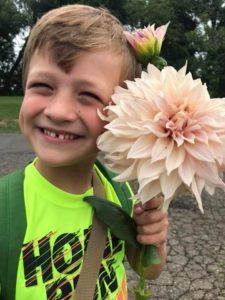
Follow the change of seasons
Just the way that eating a strawberry in the middle of the winter doesn’t even compare to the perfectly fresh and in-season summer strawberry, consuming fresh cut flowers in their season is even better! I love the seasonality of fresh flowers. It makes the anticipation of their arrival so much sweeter. Who wants spring flowers in September? Not me. Due to the importing of flowers, we are used to seeing bunches of sunflowers at the local grocery store in the dead of winter. I wish you could experience the excitement when the first sunflower opens in June – pure joy! When you purchase flowers locally, you truly get to experience flowers in all their glory. In the season they are meant to be in! We oftentimes find ourselves educating others on what is available on the farm during certain seasons. In a culture where we can get most anything we want at any time, let’s toss that idea aside and enjoy the beauty that each season has to offer. When you reunite with your favorite flower every year, we guarantee that the meeting with be that much sweeter.
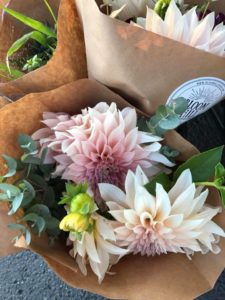
Oh, the memories!
One of my favorite things about growing flowers is their unique ability to transport you back in time. Flowers can be connected to a special time, place, person or event. At markets, we love getting to hear our customer’s memories that include flowers. The scent of a lilac in spring, the peonies on their grandmother’s peony plants, or the dahlia patch that was the center of a childhood garden. While flowers take us back in time, they also move us forward as we create more memories around them. When our blooms are given as a gift, we know the joy that person will feel and it’s our honor to be a part of that special moment.
Small farms rock!
Supporting small farms like us and other local business enriches the local economy and supports our neighbors, friends and family members. You might notice our smile when we hand you a bouquet. It’s BIG. It’s full of gratitude. It’s full of pride. While farming is hard, there is no better feeling that knowing someone will enjoy the fruits of your labor. And that, friends, is why we do what we do.
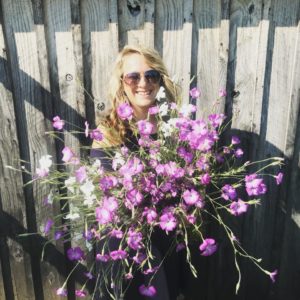
If you are looking for more ways to support local flower farms like us, there are a few wonderful advocacy groups that we are a part of that do an amazing job of educating others on the benefits of local blooms and help you find them in your area.
Slow Flowers is an award winning online directory that can help you find florists, studio designers, supermarket flower departments and flower farmers who are committed to using American-grown flowers. You can find the online directory and more at www.slowflowers.com.
The Association of Specialty Cut Flower Growers (ASCFG) was created to educate, unite and support commercial cut flower growers by providing production, marketing, flora-culture research, and educating others on the benefits of locally grown flowers. You can access their directory at www.localflowers.org.